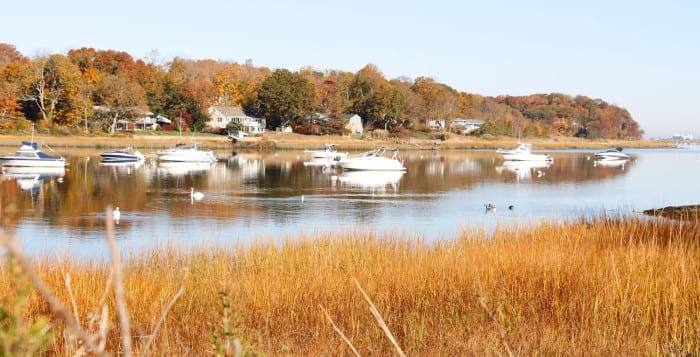Town takes on study to improve water quality

Brookhaven Town Supervisor Ed Romaine (R) said it’s time to wake up when it comes to Long Island’s water.
Up until 10 years ago, Brookhaven residents could gather clams and oysters from bodies of water like the Setauket Harbor. But that’s not the case now, according to the Supervisor, who remarked on the closing of Mount Sinai Harbor for shell fishing.
“If that isn’t a wake up call, I don’t know what is,” Romaine said.
In light of Brookhaven’s declining water quality, on Tuesday, Oct. 27, the supervisor announced that the Town of Brookhaven would take on a study that will help officials pinpoint the sources of water contamination, starting with the Setauket Harbor. Romaine said the harbor was small enough for the town to examine and clean once they receive the results next year.
Romaine said the town planned on looking at the pipes leading to the harbor, road runoff, and all drains that run to the harbor. In response to this, the town hired Cornell Cooperative Extension to conduct this study and to use DNA testing to help identify the sources of water pollution.
While high levels of nitrogen were identified in the water, Brookhaven Town Highway Superintendent Dan Losquadro (R) said nitrogen could come from various sources, including leaching from underground septic systems, wild and domesticated animal feces and fertilizers, among other sources.
Last year, Losquadro said his department finished reconstructing the sea wall along Shore Road in Setauket by removing the concrete slabs that were used in the past to construct the wall. He added that the concrete released chemicals into the water, which further affected the water quality.
Town officials said they intended to continue the study across multiple seasons, especially in the winter months, when people use fewer fertilizers and when less wild and domestic animals are out and about.
Setauket Harbor and Mount Sinai Harbor, which includes Cedar Beach, are two of several impacted waterways on the Island. According to Romaine, Moriches Bay and the Great South Bay are also impacted.
“I’m greatly concerned because each year the waterways surrounding Brookhaven Town and Long Island have been declining,” Romaine said. “Many of our harbors and parts of out tributaries are considered impaired.”
Neither the town nor the highway department will know how much cleaning Setauket Harbor’s waters will cost until after Cornell Cooperative Extension conducts its study, Romaine said. The hope is that they will identify the sources of contamination before the town’s 2017 budget is approved.
The town isn’t only working with Losquadro, but also with members of the Setauket Harbor Task force led by George Hoffman, Moriches Bay Project and Friends of Bellport Bay.
Romaine also added that those who settled on the Island would not be impressed with Long Island’s declining water quality.
“The town was founded in 1655 [and] it was Setauket Harbor that the settlers … came to start the first European settlement in Brookhaven Town,” Romaine said. “I’m sure if they were here today, they would weep at the fact that the waters are so impaired — you can’t eat any of the shellfish from the water.”






